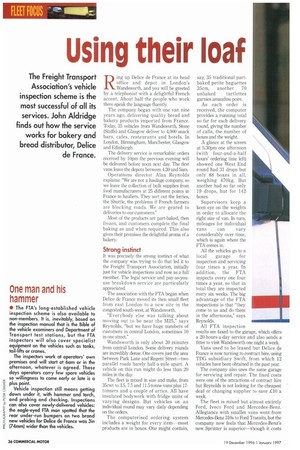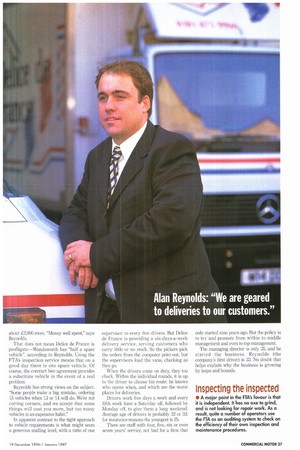Using their loaf
Page 38

Page 39

If you've noticed an error in this article please click here to report it so we can fix it.
Ring up Delice de France at its head office and depot in London's Wandsworth, and you will be greeted by a telephonist with a delightful French accent. About half the people who work there speak the language fluently.
The company began with one van nine years ago, delivering quality bread and bakery products imported from France. Today, 35 vehicles from Wandsworth, Stone (Staffs) and Glasgow deliver to 4,000 snack bars, cafes, restaurants and hotels. In London, Birmingham, Manchester, Glasgow and Edinburgh.
The delivery service is remarkable: orders received by lOpm the previous evening will be delivered before noon next day. The first vans leave the depots between 4.30 and 5am.
Operations director Alan Reynolds explains: "We are not a haulage company, so we leave the collection of bulk supplies from food manufacturers at 2.5 different points in France to hauliers. They sort out the ferries, the Shuttle, the problems if French farmers are blocking roads. We are geared to deliveries to our customers."
Most of the products are part-baked, then frozen, and customers complete the final baking as and when required. This also gives their premises the delightful aroma of a bakery.
Strong instinct
It was precisely the strong instinct of what the company was trying to do that led it to the Freight Transport Association, initially just for vehicle inspections and now as a full member. The legal service and pay-as-youuse breakdown service are particularly appreciated.
The association with the FTA began when Delice de France moved its then small fleet from east London to a new site in the congested south-west, at Wandsworth.
"Everybody else was talking about moving out to be near the M25," says Reynolds, "but we have huge numbers of customers in central London, sometimes 10 in one street."
Wandsworth is only about 30 minutes from central London. Some delivery rounds are incredibly dense. One covers just the area between Park Lane and Regent Street—two parallel roads barely half-a-mile apart. A vehicle on this run might do less than 20 miles in the day.
The fleet is mixed in size and make, from 35cwt to 3.5, 7.5 and 11.5-tonne vans plus 17tanners and a couple of artics. All have insulated bodywork with fridge units of varying designs. But vehicles on an individual round may vary daily depending on the orders.
The computerised ordering system includes a weight for every item—most products are in boxes. One might contain, say, 35 traditional partbaked petite baguettes 35cm, another 70 unbaked tartlettes garnies amandine poire.
As each order is received, the computer provides a running total so far for each delivery round, giving the number of calls, the number of boxes and the weight.
A glance at the screen at 5.30pm one afternoon (with four-and-a-half hours' ordering time left) showed one West End round had 31 drops but only 88 boxes in all, weighing 470kg. But another had so far only 19 drops, but for 142 boxes.
Supervisors keep a keen eye on the weights in order to allocate the right size of van. In turn, mileages for individual vans can vary considerably over time, which is again where the FTA comes in.
All the vehicles go to a local garage for inspection and servicing four times a year. In addition, the FTA inspects every one four times a year, so that in total they are inspected every six weeks. The big advantage of the FTA inspections is that "they come to us and do them in the afternoons," says Reynolds.
All FTA inspection results are faxed to the garage, which offers a 20-hours-a-day service and also sends a fitter to visit Wandsworth one night a week.
Vans used to be leased but Delice de France is now turning to contract hire, using TDG subsidiary Swift, from which 12 vehicles have been obtained in the past year.
The company also uses the same garage for servicing and repair. The fixed costs were one of the attractions of contract hire but Reynolds is not looking for the cheapest deal or changing supplier to save £10 a week.
The fleet is mixed but almost entirely Ford, Iveco Ford and Mercedes-Benz. Allegiance with smaller vans went from Mercedes-Benz 310s to Ford Transits, but the company now feels that Mercedes-Benz's new Sprinter is superior—though it costs about £2,000 more. "Money well spent," says Reynolds.
That does not mean Delice de France is profligate—Wandsworth has "half a spare vehicle", according to Reynolds. Using the FTA's inspection service means that on a good day there is one spare vehicle. Of course, the contract hire agreement provides a substitute vehicle in the event of a real problem.
Reynolds has strong views on the subject. "Some people make a big mistake, ordering 15 vehicles when 13 or 14 will do. We're not cutting corners, and we accept that some things will cost you more, but too many vehicles is an expensive habit."
In apparent contrast to the tight approach to vehicle requirements is what might seem a generous staffing level, with a ratio of one supervisor to every five drivers. But Delice de France is providing a six-days-a-week delivery service, serving customers who carry little or no stock. So the pickers pick the orders from the computer print-out, but the supervisors load the vans, checking as they go.
When the drivers come on duty, they too check. Within the individual rounds, it is up to the driver to choose his route: he knows who opens when, and which are the worst places for deliveries.
Drivers work five days a week and every fifth week have a Saturday off, followed by Monday off, to give them a long weekend. Average age of drivers is probably 32 or 33: for insurance reasons the youngest is 25.
There are staff with four, five, six or even seven years' service, not bad for a firm that only started nine years ago. But the policy is to try and promote from within to middle management and even to top management.
The managing director is only 35, and he started the business. Reynolds (the company's first driver) is 33. No doubt that helps explain why the business is growing by leaps and bounds.
Inspecting the inspected
• A major point in the FTA's favour is that it is independent. It has no axe to grind, and is not looking for repair work. As a result, quite a number of operators use the FTA as an auditing system to check on the efficiency of their own inspection and maintenance procedures.








































































































































